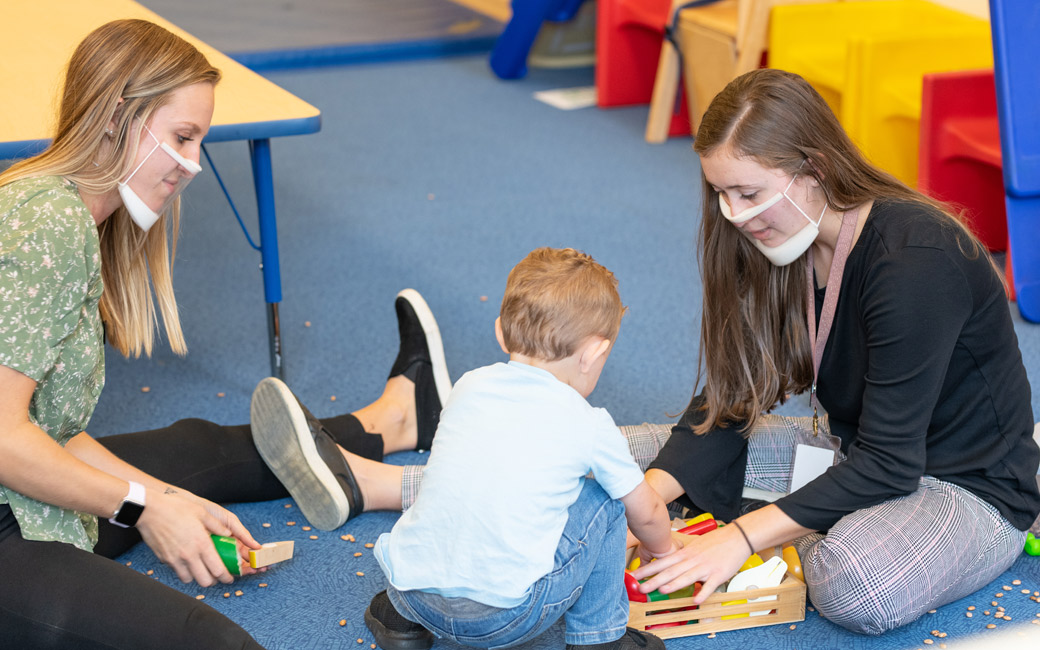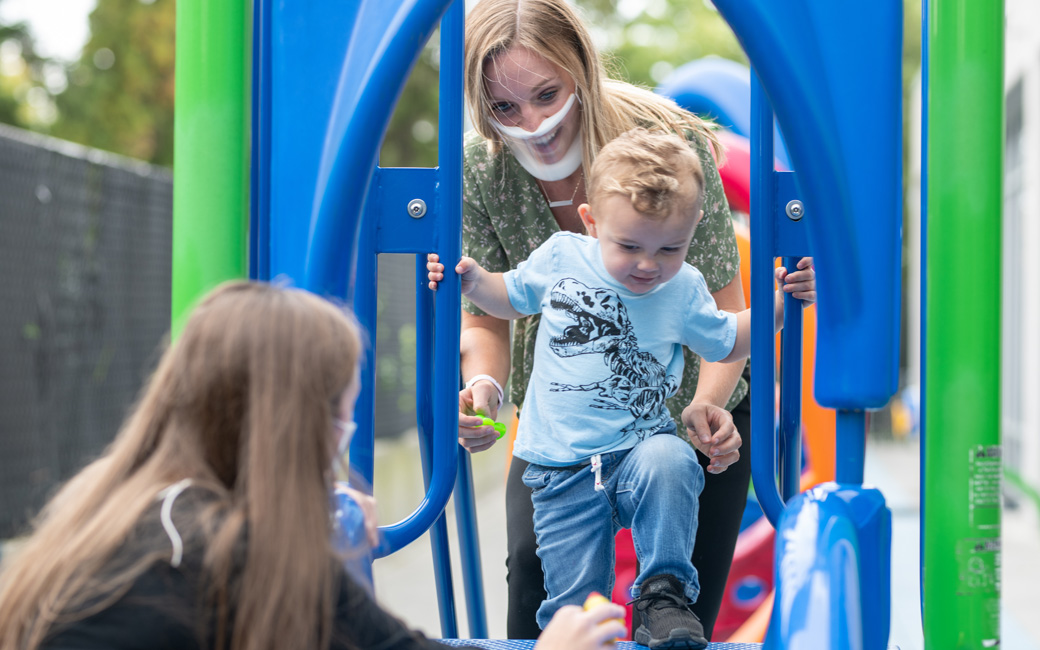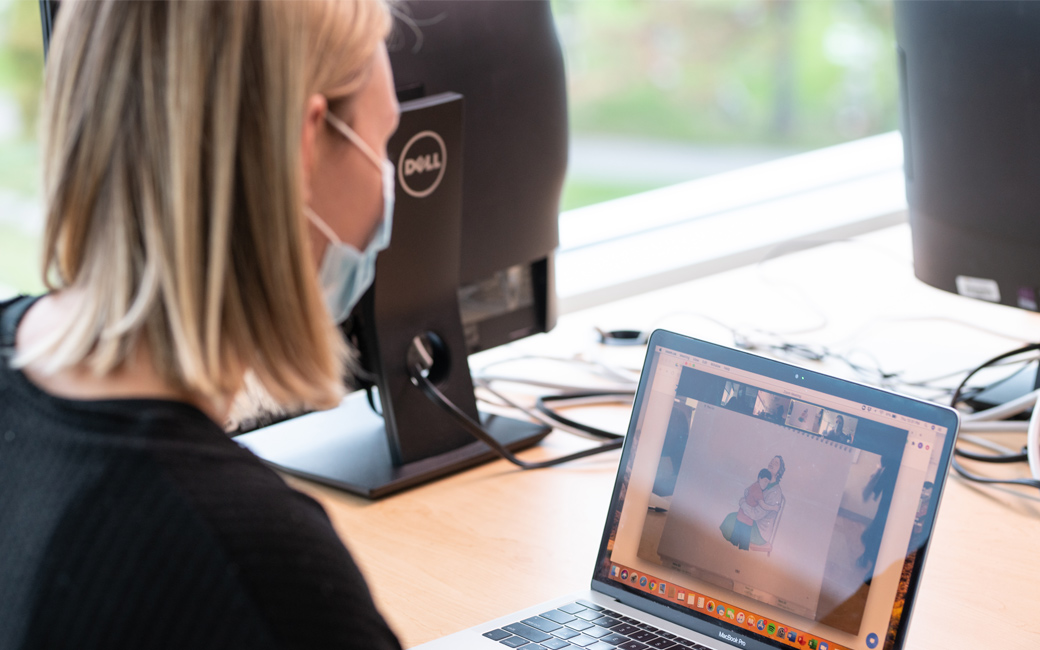‘Lemonade from lemons’: IWB pivots to hybrid model for student, client success
Institute for Well-Being safely seeing patients, getting student-clinicians needed experience
By Cody Boteler on November 11, 2020

On an early October morning at the Institute for Well-Being (IWB), Jolee Raines and Lizzie Mann, both in their first year of the speech-language pathology master’s program, are sitting on a bright blue rug and smiling through transparent face masks.
In front of them stands a preverbal toddler who’s there to work on his communication skills.
That means learning to use gestures, like pointing to a box that he wants help opening or repeating “buh buh buh” when talking about blocks or other b-words.
It can look like playtime, and in a lot of ways, it is. That’s how young children learn, says Sheryl Lasson, an adjunct graduate clinical supervisor for the program.
“But it’s more sophisticated than ‘just’ play. We have goals, and we set up scenarios in that play,” Lasson says. “It’s in the way the child is led to do certain things and to move forward in certain ways. We are very definitive in what it is that we’re doing in that play.”
Raines has already seen a lot of progress in this client. He’s less nervous and is using more communication gestures.
“I think it’s so fun during all this to meet with a client face to face,” Raines says. “I feel like I am making an impact.”

Raines and Mann are just two of the students at the IWB getting the clinical experience they need to complete their education and serve the patients who depend on the IWB despite the COVID-19 pandemic.
“Things came to a screeching halt, obviously, right before spring break,” says Karen Pottash, director of the Speech & Language Center at the IWB. The whole IWB quickly pivoted to offering telehealth services in late March.
“And after Labor Day, we opened back up for in-person activities. And things are going very well,” Pottash says.
The same is true of the other centers that make up the IWB: the Hussman Center for Adults with Autism, the Hearing & Balance Center and the Occupational Therapy Center.
All the centers are operating in a hybrid model, says Sharon Glennen, director of the IWB.
Group classes in the Hussman Center, for example, have switched to online modalities where students and clients can all continue to interact with each other, and clients in occupational therapy are being seen by student-clinicians in full PPE or in telehealth settings.
“We’ve made lemonade out of lemons,” Glennen says.
The Hearing & Balance Center uses a system that allows student-clinicians to help clients adjust settings on their hearing aids through virtual visits. It has also set dedicated times for curbside consultations in addition to one-on-one appointments, says Amanda Kozlowski, the center’s director.

The center uses case simulations, so students can get the necessary experience running diagnostic tests on problems with hearing.
“Now we’re back open at reduced capacity, but we kept those telehealth and remote
programs,” Kozlowski says. “It’s really incredible to look back and say, ‘wow, we
did this.’”
Any time people are inside together in any of the centers, it’s for a limited amount
of time, and the room is aired out before it’s used again. And, like all of Towson
University’s campus, there is an ample supply of hand sanitizer and disinfecting wipes.
The shift to appointments over Zoom and other digital learning opportunities has been substantial.
Professor Karen Fallon, director of the graduate program in speech-language pathology, thinks it will ultimately be a good thing that the student-clinicians are getting so much experience with digital health tools.
“Digital health visits are a way to reach people who have accessibility issues in terms of transportation, mobility or geography,” she says. “I don’t think the need for digital health visits will go away.”
It’s a feeling shared by the students in the program. Annie Loscalzo, a first-year speech-language pathology graduate student, says the faculty and staff have been “bending over backward” to help the students get the most out of their experience. That includes establishing the hybrid model involving digital health visits.
“COVID will change the way we live, forever. We’re getting that experience first. We’ll be the speech-language pathologists who can figure this new system out and are starting the change,” she says.
This story is one of several related to President Kim Schatzel’s priorities for Towson
University: TU Matters to Maryland and BTU-Partnerships at Work for Greater Baltimore.